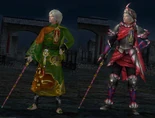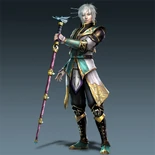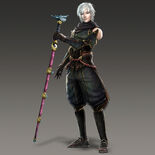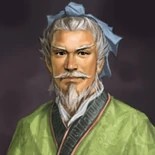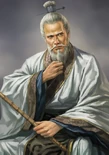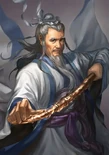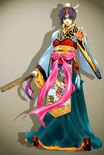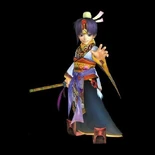| Taigong Wang | |
| Force: | |
| Height: | 175 cm (close to 5'9")
|
| Weapon(s): | Fishing rod
|
| Type: | Technique (WO2) Wonder (WO3) |
| Significant Battle(s): | |
| First Appearance: | Warriors Orochi 2 |
| Real name: | Lü Shàng
Lü Wàng |
| Chinese/Japanese name: | 呂尚 - 吕尚
呂望 - 吕望 |
| Born: | ?
|
| Died: | ?
|
| His style name is Ziyá (子牙). Through his ancestral surname of Jiāng (姜), he is also referred to as either "Jiāng Ziyá" (姜子牙) or "Jiāng Shàng" (姜尚). | |
Taigong Wang (太公望, onyomi: Taikō Bō) is one of the names for a famous Chinese minister named Lu Shang. He is famous for his contributions in destroying the Shang Dynasty. Years after his death, he has been celebrated as a masterful strategist who is called one of the greatest strategists to ever grace China, sharing the title with Zhang Liang.
In Dynasty Warriors Vol. 2, his name was originally localized in English as Jiang Taigong. He was the second most popular Warriors Orochi original character in the Warriors Orochi 3 Ultimate Halloween costume poll.
In Koei's Fengshen Yanyi series, his incarnation is first introduced as a 21 year-old man. He is five centimeters shorter than his Warriors counterpart (about 5'7") and weighs 59 kg (130 lbs). Mystic Heroes calls him Tai in the English localized script.
Role in Games
"Well, at least your boasting's not entirely unjustified."
- ~~Da Ji; Warriors Orochi 2
Dynasty Warriors
In Dynasty Warriors Vol. 2, Jiang Taigong appears as a guardian for the treasure trove in Shu's version of the Wu Zhang plains. As an officer, he gives small increases to the player's attack and growth. His skills allow sorcerers to join the players unit, Restore, which will immediately recharge another officer's ability, Wings, which allows the player to jump during a charge attack and Elude, which heals the player every time they make a parry.
Warriors Orochi
Taigong Wang first appears in the world with Fu Xi and Nu Wa to try to stop Orochi. With an army of other mystics, he acts as the army's main leader and strategist. He orchestrates several magical ploys to take place during the battle. In the end, they are defeated and forced to rethink their strategy.
He appears after the main conflict in Warriors Orochi 2 and pursues the fleeing Da Ji. He tracks her to Shi Ting and uses Liu Bei's attack as a diversion to capture her. When this fails, he joins with Shu and acts as one of the army's strategists. He discovers her whereabouts at Odani Castle and goes with Lu Xun to lead the assault. He successfully captures Da Ji and Himiko with help from Zhuge Liang who appeared when Himiko nearly escaped. He sends them to the army's main camp in a lightly armed cart, knowing they would use this chance to flee. When Zhuge Liang questions this, Taigong Wang simply replies it would be easier to have all of Orochi's supporters in one place at once.
During the final battle at Wu Zhang Plains, he opens the locked gates by concocting an illusion of rolling boulders on enemy lines. His efforts allow his allies to fight Orochi. When they claim victory, Taigong Wang thanks Liu Bei for teaching him the strength of humanity and rides off.
He has an additional dream stage with his mystic comrades in Musou OROCHI Z as they face the heroes from both time periods at once to prove the might of mystics. While the trio of mystics are fascinated with testing humanity's might, he isn't pleased when Da Ji insults them and only stops his aggressions since San Zang stops them. During the battle at Chi Bi, he acts as the army strategist and coordinates their offensive.
Returning to the mystic realm after Orochi's second defeat, Taigong Wang was unaware of any threat to the dimensional realm until Hydra emerged. To save what remained of humanity, he descended once more and rescues Yoshitsune and Masanori. With his two companions, Taigong Wang immediately begins his plans to stop Hydra. He is well aware of Shuten Dōji's true identity and desires to have the demon side for humanity. As he and his party fail to beat the demon into submission at Shouchun, the coalition swiftly come to their aid. After the battle Taigong Wang acts as the coalition's prominent strategist for coordinating each regiment's activities and locations throughout the game's story.
Taigong Wang eventually convinces Shuten Dōji to help them at Xuchang and keeps a close eye on the demon's behavior. The mystic desires to have the demon learn humanity's strengths like he did in the previous title. Once Shuten Dōji remembers his past and willingly stands against his roots, Taigong Wang uses his magic and the demon's spirit to enhance the divine siege weapons the coalition gathered; the union of machinery and sorcery is the key element to weakening Hydra's giant form. During the True Ending of the game, he unites his powers with the other mystics to save humanity from the dimensional world's fate.
In the Ulitimate, Taigong Wang with Noh, Guan Yu and Zhang Fei are suddenly attacked by Guan Suo for an unknown reason, until Yueying, Ieyasu, and Dian Wei arrived to rescue him and their allies from Guan Suo's force, and soon finding out that Bao Sanniang is the impostor from Tamamo's tails. In the Mirror realm version, Taigong Wang advises the general to fake his own death to lure out Guan Suo. Once Guan Suo is successfully convinced to lay down his arms, the two move to attack the impostor Bao Sanniang.
Fengshen Yanyi
In the series, Taigong Wang is the default name for the main hero in Fengshen Yanyi. Unlike his Warriors series counterpart, he is a relatively modest youth with a strong sense of justice. He is the protagonist who just became a mystic after years of training. His master asks him to check the human world based on odd premonitions the elder has been having. Once Taigong Wang sees the devastation, he volunteers to stop Da Ji. He travels with Huang Feihu to amass a great army while simultaneously sealing the souls of their opponents with his divine iron whip. To his surprise, his allies designate him as the army's commander when they reach Ji Fa's kingdom. He and his friends eventually defeat Da Ji and save the world from her schemes. When Ji Fa assumes the throne, Taigong Wang decides to go on another journey to see what the peaceful world has to offer. He does so without taking either of the two maidens who bicker to go with him, whom are Deng Chanyu and Baihe Tongzi.
During the timeline in Magical Fengshen, Taigong Wang is heralded as a legendary hero and one of the four who sealed away Da Ji's soul. He spends his days leisurely fishing by a river and, while the protagonists are transformed as fish, are caught as one of his catches. Once he realizes that they were looking for him, he aids them by handing them two treasures. He would have volunteered to aid them more, but the trio was following heaven's will and he was destined to not intervene. Shortly after, he calls for a dragon and flies away to regions unknown.
His position as the series' main protagonist is replaced with Ziya's introduction. By the time Fengshen Yanyi 2 takes place, he is still working to vanquish demons and specters on the human world. He first meets Ziya by protecting them with a gust of wind and rescues Ziya's party. They formally meet and agree to join forces when he meets Li Lan. When Mount Yu's gate opens, however, he is mysteriously separated from Ziya and Li Lan. Stuck into a dimension between the living, dead, and mystic realm, Li Lan later guides him with her powers back to the mortal world and is taken by Yang Jian to properly recuperate in the mystic realm. He continues to have a supporting role when the heroes reunite later in the game. Both heroes seal the souls of the fallen and the power of tao together in the end. After the final battle, he decides to stay in the human world and restore the cities ruined during the conflict.
Character Information
Personality
Taigong Wang is a composed yet somewhat boastful mystic who believes that all of his plans are spectacular. Despite his smug cockiness, he is a just man who seeks to eradicate evil with his intellect and skills. Implied to be the youngest of the mystic trio, he admits that he does not understand humans very well and, at first, believes that he is superior to them. His time with Liu Bei's troops has him admire the traits found with humanity lacking with other immortals and supernatural beings. As he stays with them, he also believes on relying a little more on risk rather than his "perfect calculations" -such as allowing Da Ji and Himiko's escape. He has a newfound respect for humanity as he finishes his mission to defeat Orochi, regarding mortals as strong yet curious beings of nature.
While Da Ji openly belittles him as a "boy" and other jeering names, Taigong Wang acts unaffected by her insults and responds with his intentions for her inevitable capture. In spite of his calm retorts, neither of them like to admit defeat and mutually refuse to accept the other's company. Like the rest of his mystic allies, he isn't pleased with Sun Wukong's villainous actions. He praises his mystic allies, Sanzang, Liu Bei, and Zhuge Liang.
Character Symbolism
Within his game appearances, Taigong Wang uses the divine whip granted to him from his master. Fengshen Yanyi titles calls it Fengshen Whip and has it serve as a club with magical properties. When he attacks in the drama CDs, the weapon make a distinct whipping sound. Taigong Wang uses it each time he defeats his foes, granting them a passage to the afterlife as a deity. Performing this act is a type of sealing is called fengshen, or "assign god". When he used the whip as a weapon in the novel, it could to strike the very minds of men and could crack the skulls of supernatural beings. Jiang Ziya's sealing was performed once at the end of the original novel for 365 gods.
Warriors Orochi makes the whip instead resemble a slender fishing rod. Together with the underground flail in his moveset, his weapons are a likely reference to the legendary fishing techniques he used to be noticed by Prince Wen (which ironically at the time, Jiang had no actual lure attached to his rod). The aforementioned Fengshen Whip acts as his third weapon. He can also instantly summon gusts of wind in his Warriors appearance, which took Jiang Ziya at least a day of praying to achieve.
The names for his weapons in the Warriors Orochi series are references to mystical treasures used in Fengshen Yanyi. His first weapon is named Golden Whip and fits the description of one of Wen Zhong's weapons. It had the power to conjure thunderstorms and lightning instantly in one swing. Within the novel, Wen Zhong wielded dual versions of the same whip to strike fear into his enemies.
Taigong Wang's second weapon takes its namesake from Mother Golden Spirit, Wen Zhong's superior being mentor. Though only mentioned by name in the first half of the Fengshen Yanyi novel, she personally appears in the story after Mother Fire Spirit was killed in battle against Guang Chengzi. Golden Mother Spirit heard of the news and angrily resented Jiang Ziya. Together with Mother Invincible, she descended to join the Shang army's defense. As wielder of one of the four treasure swords, she challenged and killed Princess Longji and her husband in combat. She died in battle after she tried to dispatch three of Grand Master of Heaven's disciples simultaneously. When Jiang Ziya was assigning gods, she was named Honorable Goddess of the North Pole Dippers.
His fourth whip, Raikōpen (lit. Thunder Duke Whip), doesn't actually appear in the original novel. However, it does exist within a popular rendition of the story. It was wielded by Shen Gongbao, Jiang Ziya's friend-turned-enemy in the original epic. The comic makes Shen Gongbao's whip exceedingly powerful and a weapon of mass destruction. Shen Gongbao is known as a fighter within the comic, but he actually fit the trickster and strategist role within the original narrative. Shen Gongbao originally rode a mystical white tiger and wielded a heavenly gem and sword. He often worked behind the scenes to change the tides to his favor rather than fight himself. The pinyin reading of the weapon (Léigōngbiān) implies that its namesake is derived from the Daoist deity of thunder Lei Gong who punishes wrongdoers and evil spirits alike.
Voice Actors
- Michael Sinterniklaas - Warriors Orochi series (English-uncredited)
- Daisuke Kishio - Warriors Orochi series (Japanese)
- Kentarō Itō - Fengshen Yanyi series (Japanese)
Quotes
- See also: Taigong Wang/Quotes
- "Ah, to see such beauty in such a misbegotten world."
- "Death and rebirth. It is time to stop this mad cycle of serpent kings. The last battle may not have gone well, but this is the final chapter."
- "Oh, I didn't notice you there, boy. You tend to blend in with the background."
- "Your futile mouthings will not save you now. It ends here."
- ~~Da Ji and Taigong Wang; Warriors Orochi 2
- "I've been fishing for over five hours... You humans truly are strange. You must be growing tired of fishing with me by now. How about we talk a bit about some of my strategies?"
- "Thank you, my lord!"
- "Such earnest passion and tenacity... You will make a fine strategist, Lu Xun."
- ~~Taigong Wang and Lu Xun; Warriors Orochi 3
Gameplay
Moveset
Warriors Orochi
| Keys: |
Ground Moveset
 : Quickly slaps a dusty gust of wind forward. Deals little damage but leaves foes open to attack from stagger. Cannot kill generals, and one of the few C1 attacks that can activate elements.
: Quickly slaps a dusty gust of wind forward. Deals little damage but leaves foes open to attack from stagger. Cannot kill generals, and one of the few C1 attacks that can activate elements. ,
,  , (
, ( ): Drags his grail lure that is hidden in the ground upward and launches enemies. Additionally smashes the lure downward to make a launching quake, and leaves a yin-yang trap/mystic bomb upon doing so.
): Drags his grail lure that is hidden in the ground upward and launches enemies. Additionally smashes the lure downward to make a launching quake, and leaves a yin-yang trap/mystic bomb upon doing so. ,
,  ,
,  , (
, ( ), (
), ( ), (
), ( ): While standing upright and slowly walking forward, he flicks his fishing rod in front of him a few times once per button press. On the final press, he then turns around and smashes the ground with his lure, which causes a staggering shockwave (inflicts crashing knockback on airborne foes). Leaves a yin-yang trap/mystic bomb.
): While standing upright and slowly walking forward, he flicks his fishing rod in front of him a few times once per button press. On the final press, he then turns around and smashes the ground with his lure, which causes a staggering shockwave (inflicts crashing knockback on airborne foes). Leaves a yin-yang trap/mystic bomb. ,
,  ,
,  ,
,  : Brings out his lure, hops from a small running start, and then stomps on it to create a quake. Clears away foes and leaves a yin-yang trap/mystic bomb.
: Brings out his lure, hops from a small running start, and then stomps on it to create a quake. Clears away foes and leaves a yin-yang trap/mystic bomb. ,
,  ,
,  ,
,  ,
,  : Turns his back to his foes with his arms still behind him. While in this position, he heaves his lure in an upwards arc to smash it in front of him making a ground flashing quake. Leaves a yin-yang trap/mystic bomb in the area behind him afterwards.
: Turns his back to his foes with his arms still behind him. While in this position, he heaves his lure in an upwards arc to smash it in front of him making a ground flashing quake. Leaves a yin-yang trap/mystic bomb in the area behind him afterwards. ,
,  ,
,  ,
,  ,
,  ,
,  : Spins his rod around him as his lure is fished out to flail it around steadily. He then slams it down in front of himself for a light ripple that launches. Leaves a yin-yang trap/mystic bomb.
: Spins his rod around him as his lure is fished out to flail it around steadily. He then slams it down in front of himself for a light ripple that launches. Leaves a yin-yang trap/mystic bomb. ,
,  ,
,  ,
,  ,
,  ,
,  : While Taigong Wang steps forward, he articulately swings his rod twice before taking another step; first to the right inward, then to the left outward in a full turn, leading into an outward whipping, then an overhead strike (similar to throwing his lure) followed by a reeling lifting flick (as if he fished something up), with the last blow as a turning backhanded swing with the weapon in his left hand.
: While Taigong Wang steps forward, he articulately swings his rod twice before taking another step; first to the right inward, then to the left outward in a full turn, leading into an outward whipping, then an overhead strike (similar to throwing his lure) followed by a reeling lifting flick (as if he fished something up), with the last blow as a turning backhanded swing with the weapon in his left hand. ,
,  ,
,  ,
,  ,
,  ,
,  ,
,  ,
,  ,
,  : After the fifth blow, Taigong Wang restarts his first three normal blows, then ends it with from the right, lobbing his lure in a wide clearing attack while he spins around almost losing balance. This chain replaces his standard one after his full moveset is unlocked.
: After the fifth blow, Taigong Wang restarts his first three normal blows, then ends it with from the right, lobbing his lure in a wide clearing attack while he spins around almost losing balance. This chain replaces his standard one after his full moveset is unlocked.- Dashing
 : While braking to a stop, he swings his rod outward to the right in a wide-sweeping flick as he places it back on his shoulder again.
: While braking to a stop, he swings his rod outward to the right in a wide-sweeping flick as he places it back on his shoulder again.  ,
,  : Swipes his rod downward inward.
: Swipes his rod downward inward. ,
,  : Levitates for a moment to bring out his lure, creating a ground explosion in the area below him. Done in a similar manner to fishing up something caught on his lure, only from a midair position.
: Levitates for a moment to bring out his lure, creating a ground explosion in the area below him. Done in a similar manner to fishing up something caught on his lure, only from a midair position. : Taigong Wang performs a fishing maneuver and summons large columns/geysers of water, then his lure emerges from the ground and falls back through for a shockwave. Wang is knocked to the ground on his bottom, while he rubs it to ease the pain while getting back up.
: Taigong Wang performs a fishing maneuver and summons large columns/geysers of water, then his lure emerges from the ground and falls back through for a shockwave. Wang is knocked to the ground on his bottom, while he rubs it to ease the pain while getting back up. (True): Same as before, but Taigong Wang lifts his lure up into the air via levitation and smashes it down on the ground for a clearing attack.
(True): Same as before, but Taigong Wang lifts his lure up into the air via levitation and smashes it down on the ground for a clearing attack.- R1: Lift-points his rod into the air and detonates all of the glowing yin-yang marks/mystic bombs in the area. The yin-yang symbol radiating around him will repel foes with crashing knockback. Any activated traps/bombs will launch enemies upward via a normal launch via the same explosion from his jumping charge. Only a total of five yin-yang symbol bombs can be left on the battlefield.
- R1 (Counter): Flips back a short distance and, while on one knee, hurls a series of wind gusts that launches targets in range. The three gusts of wind appear instantly just after the first initial one.
Mounted Attacks
 : Conjures a whirlwind to circle around him.
: Conjures a whirlwind to circle around him. ,
,  ,
,  ,
,  ,
,  ,
,  : Rotates his wrist inward and outward to swing his rod to his right.
: Rotates his wrist inward and outward to swing his rod to his right. : Faster version of
: Faster version of  chain while the horse charges forward.
chain while the horse charges forward.
- Triple Attack 1: Slams giant lure unto the ground.
- Triple Attack 2: Sends out three watery whirlwinds forward.
- Triple Attack 3: Unleashes a surge of aquatic energy in front of the user.
- Warriors Orochi 3
Character type changed from Technique to Wonder. Gains the ability to Spirit Charge Cancel and a reprises a previous Type Action.
 : Same as before, but now only inflicts normal hitstun and no longer activates weapon elements. Its damage is also drastically lowered.
: Same as before, but now only inflicts normal hitstun and no longer activates weapon elements. Its damage is also drastically lowered. ,
,  ,
,  : Same as before, but now naturally activates attributes/elements on both inputs.
: Same as before, but now naturally activates attributes/elements on both inputs. ,
,  ,
,  , (
, ( ), (
), ( ), (
), ( ): Same as before, but now undergoes the same stunned-hit-effect-physics change as with all the other characters. Now stuns instead of staggers on grounded hit, as well as having a different shockwave effect.
): Same as before, but now undergoes the same stunned-hit-effect-physics change as with all the other characters. Now stuns instead of staggers on grounded hit, as well as having a different shockwave effect. ,
,  ,
,  ,
,  ,
,  ,
,  ,
,  ,
,  ,
,  : Same as before, but the lure no longer appears during the final blow.
: Same as before, but the lure no longer appears during the final blow. ,
,  : Same as before, only it carries a bit of Taigong Wang's horizontal aerial momentum. Now activates weapon elements due to using a different type of explosion.
: Same as before, only it carries a bit of Taigong Wang's horizontal aerial momentum. Now activates weapon elements due to using a different type of explosion. : Same as before, but now styled as a Mystic-Musou Attack, lasts for a set duration and always uses his True Musou finisher. The finisher also activates weapon attributes/elements.
: Same as before, but now styled as a Mystic-Musou Attack, lasts for a set duration and always uses his True Musou finisher. The finisher also activates weapon attributes/elements.- R1: Exactly the same as his original Type Action special, only the knockback caused by it is normal and has no crashing effect. All bombs now activate weapon attributes, but activation from multiple bombs cannot stack on the same target. The explosion effects change in accordance to the type of bomb laid down by any specific prior charge attacks.
 (Cancel): Dashes forward a distance with his rod extended in a thrust.
(Cancel): Dashes forward a distance with his rod extended in a thrust. , R1 (Ultimate only): Fishes out his lure to launch enemies upward and then brings it in front of himself into his free hand, pushing it back down through underground (causing a quake) while somersaulting back and leaving behind six glowing yin-yang marks on the ground around the center of impact. Both hitboxes of the attack launch targets, and the first part will detonate the orbs like with the grounded version while hitting OTG. The bombs here will always use the same explosion effects as his jumping charge, C2 and C6.
, R1 (Ultimate only): Fishes out his lure to launch enemies upward and then brings it in front of himself into his free hand, pushing it back down through underground (causing a quake) while somersaulting back and leaving behind six glowing yin-yang marks on the ground around the center of impact. Both hitboxes of the attack launch targets, and the first part will detonate the orbs like with the grounded version while hitting OTG. The bombs here will always use the same explosion effects as his jumping charge, C2 and C6.
Mystic Heroes
| Keys |
Fighting Style
Much like his fellow mystics, Taigong Wang once mastered is a force to be reckoned with. Taigong Wang strikes a balance between both crowd clearing and dueling. He has an equal amount of sweeping attacks that end with explosions, and one-on-one attacks that combo well. The range on his Musou is somewhat difficult to judge making it tricky to use effectively. However, an easy way to land his Musou is to hit with his C1 in a mid range. This allows you to deal massive damage thanks to his Musou's insane damage output. All of his yin-yang traps/mystic bombs are great for setting up strategic traps in certain locations, though they disappear and must be set down again if Taigong Wang switches out with another character.
However, on higher difficulties, taking advantage of Taigong Wang's bombs is key, for they can activate elements, allowing him to deal damage as well as sustain himself to great lengths. Via both Technique and Wonder incarnations of him, Taigong Wang can also make solid use of their critical hit mechanics, only for the latter his C1 is no longer as optimal due to a heavy nerf applied in Warriors Orochi 3.
However, in Warriors Orochi 3, his Spirit Charge arguably has the biggest hitbox there is compared to the rest. Added with the Echo attribute via Spirit Canceling out of his C1, Taigong Wang can easily generate combo attributes in the Ultimate expansion with ease, and make use of his elemental activation on his R1 bombs to sustain himself with Absorption and Osmosis for hybrid weapon setups.
In the Fengshen Yanyi series, Taigong Wang is a balanced character who has the greatest versatility of the playable cast. He can excel in any aspect the player chooses and has a strong magic stat to support any magic he may use. His defeat equals a game over in the first game, so keep him leveled up whenever possible.
Taigong Wang continues to be a balanced character in his following appearances, but he loses speed to compensate. He can control the five elements in Fengshen Yanyi 2. Like Ziya, he can increase the amount of experience earned once he is in the ally party. His battle ability clears foes away from him. He reunites with Ziya very late in the game, so the player will likely need to level him up if they wish to have his abilities be on par with the main party.
He is relegated to lightning based attacks in Mystic Heroes.
Here are his weapon and spell proficiencies in Fengshen Yanyi.
- Sword - 1/7
- Spear - 1/7
- Club - 1/Master
- Bow - 1/7
- Earth - 1/Master
- Healing - 1/Master
- Illusion - 1/Master
- Chi - 1/Master
The following lists his battle statistics in Mystic Heroes.
- Magic Type: Lightning
- Power: 3/4
- Magic: 4/4
- Jump/Speed: 1/4
Weapons
- See also: Taigong Wang/Weapons
Warriors Orochi 3
Big Star Weapons
Taigong Wang uses the following big star weapons in the game.
- Conjurer's Rod
- Celestial Rod
Warriors Orochi 3 Ultimate
| Lightning Rod X | |
|---|---|

|
Base Attack: 60 |
| Compatibility Bonus: 18 | |
| Mystic Beauty | |

|
Base Attack: 55 |
| Compatibility Bonus: 18 | |
Acquiring Mystic Weapon
- Chapter 1: Struggle for Ueda Castle - Defeat Wen Chou, Yan Liang, and 800 enemies in under 10 minutes.
- Chapter 3: Battle of Tong Gate (Redux) - Defeat Sima Yi and 500 enemies in under 7 minutes.
- Chapter 4: Prelude to Apocalypse - Defeat Lacerta and Vulpecula in under 5 minutes.
Historical Information
Lu Shang was a military adviser who is famous for founding the state of Qi. His other names include Taigong Wang, Taigong Ziya, Jiang Ziya, Jiang Shang, Jiang Taigong, and Lu Wang. King Wu of Zhou (Ji Fa) was said to have called him "Father Shang" (尚父, Shang Fu). His name as Jiang Ziya was popularized during the Tang Dynasty, in which he was famed as a masterful strategist and was enshrined at Wǔ Miào (武廟), otherwise known as the Temple of Emperor Guan. It is said that he was called Taigong Wang when King Wen of Zhou (Ji Chang) was introduced to Lu Shang. Ji Chang asked him if he was a normal person since he looked much younger than his wizened age suggested.
His exact origins and the matter of how he started serving King Wen are unknown. While he is attributed to have written the Six Secret Teachings, the author as well as Lu Shang's actual involvement in the writings of the book are unclear. Since little is personally known about him, he has escalated to a legendary status in history and myths. According to fables, he possibly could have been a descendant of the Qiang people.
Life
Lu Shang was one of the upper classed advisers for the Zhou Dynasty. He was said to have either originated from Xuchang, Henan or Linquan Xian, Anhui. He was either Ji Chang's Senior Grand Tutor or was one of Ji Chang's Prime Ministers. He was considered an good omen for Zhou. After Ji Chang passed away, he served King Wu of Zhou (Ji Fa) as his Senior Grand Tutor. He assisted Duke Ji Fa's campaigns into the Muye District. When he helped topple the Shang Dynasty with great renown and cunning, he also formed the foundations for the Qi state. After Qi was established, his general activity mysteriously disappears from historical records. A few stories say that he disappeared into the Dongyi people or that he was last seen heading far into Shandong. His posthumous name was Qi Taigong (lit: Prosperous Elder Duke).
Years after his death, his supposed descendant, Lu Guang, honored him with the temple name, Shǐ Zǔ (始祖).
Legendary Tales
Many tales regarding Lu Shang refer to him under one of other known names in life or in folktales. Generally, he is painted as a wise and intelligent elder who has an abundant amount of talent and patience. His age when he first started serving King Wen range from 60~85 years old. He is also said to be one of the possible origins for Jiang Tai Gong (姜太公), the God in Charge of Granting Titles to Gods.
The story of how he first met King Wen is particularly famous. Desiring to have a new strategist, the king found Lu Shang fishing casually by Wei River. Glancing at the elderly figure, King Wen grew to believe that he had potential to foster his dreams of conquest. He supposedly exclaimed that although Lu Shang was old, he was the hope that he was waiting for, hence supposedly leading to his name, Taigong Wang. A variation of the tale adds that Lu Shang only used a straight fishhook, without bait, three feet above the water, for angling. When asked the reasons for his odd fishing method he said, "What I’m angling is not a single fish but the emperor and the great many vassals. Only those who really wish to be fished would be finally fished by me." He meant that he was waiting for someone great to notice him, which eventually got King Wen's attention.
His fabled marriage to a woman is also a popular tale about him. Before he entered government service, he was married to a woman. However, since he spent most of his time working and reading books, they got divorced. Later, when the Qi state was established and he rose high into official ranks, the woman offered to reconcile. Lu Shang answered by bringing a bin of water and dropped it onto the floor. He then asked if it was possible for the woman to recollect the water into the container. Naturally, since the bin smashed into pieces, completing the task was unlikely but she tried with earnest. After watching her attempts, he bluntly said, "Once it is broken, it is impossible to return spilt water to a fallen container. It is futile to try to do the same with you and me." He refused her wishes to be reunited and parted ways. The episode is said to have been the origin behind the proverb, "Fù shuǐ nán shōu" (覆水难收). Though the phrase apparently reflected Lu Shang's original words, they were also spoken during the Han Dynasty for a similar incident. The English equivalent for this anecdote would be, "Don't cry over spilt milk."
Fengshen Yanyi (novel)
He is a prominent character who is called Jiang Ziya. After the Shang Dynasty is thoroughly established as a corrupt and wicked rule, he is formerly introduced into the story in chapter 15 as a Grand Master of Chan Taoism. His master, Heavenly Primogenitor, and other divine beings foresaw that 365 new gods were to be created when the Shang Dynasty falls. Seeing Jiang Ziya as the chooser of these gods from various fallen souls, his master ordered him to descend from Mount Kunlun and attend to his predestined duty. Although he expressed his desires to continue living peacefully with his master for eternity, Jiang Ziya obeyed and bid a tearful farewell to his master.
Once in the human world, he was pretty lost on where to start his new duty so he paid a visit to his rich and popular sworn brother, Song Yiren, at Song Village. His sworn brother decided to grant Jiang Ziya a wife and the newly wed couple lived for a time under Song Yiren's care. To repay his sworn brother's kindness, he tried to adopt various crafts and trades to make do in the capital. After failing to sell rakes, trade flour, and run his own restaurant, Jiang Ziya found his true calling with fortune telling as he could predict future events with startling accuracy. He was also gifted with spotting supernatural beings and knew how to deal with them. He was brought before King Zhou after he brutally slays Wang Guiren while surrounded by a large crowd. Once he proved that he actually killed a specter, he was appointed as Junior Minister and Director of the Imperial Observatory for the capital, Morning Song. While he joyfully celebrated his new position and felt obligated to repay Bi Gan for bringing him to the court, he was unaware that the appointment was suggested by an angered and vengeful Daji.
Not long after his arrival, Daji created plans for a large and needlessly extravagant forty-nine foot tall building which she called the "Happy Terrace". Its halls and towers were to be made with jewels and engraved with divine images, which she reasoned would attract various divine beings with its beauty. She convinced King Zhou that Jiang Ziya was the only official in the kingdom who could construct it. Knowing that he would soon meet disaster, he tried to address the building's construction rationally. Unfortunately, he made a mistake by pointing out the king's not so majestic qualities and was ordered to be immediately executed. Fleeing for his life, he feigned suicide by jumping into the river. While out of sight, he rode a water cloud to safety and returned to his home. He told his wife that he desired to head towards the Western Foothills and urged her to join him. Despite his promises of fame and fortune, she declined and they divorced. Bidding farewell to Song Yiren, he and hundreds of other refugees are refused entry through the five passes by Zhang Feng. Unsuccessful in convincing the general to let them pass, Jiang Ziya summoned for a fierce wind to carry him and the refugees safely over the passes during dusk the same day. They landed near West Qi City and decided to live their days in peace.
Meeting Prince Wen
After issuing a volunteer project to construct the future-telling Spiritual Terrance, Prince Wen and his people were in high spirits. One night he had an odd dream involving a white faced tiger with wings. When he related the dream to one of his vassals, they replied that a talented minister would soon arrive from the Western Foothills. Taking his advice, Prince Wen set out to look for his predestined retainer.
Meanwhile, Jiang Ziya had spent his days fishing and studying various scrolls near Panxi Stream. While he leaned against a tree, he heard a song and he was soon in the company of a woodcutter named Wu Ji. Taking a break, Wu Ji sat beside Jiang Ziya and criticized his no hook, no bait fishing rod. Chatting for a time, Jiang Ziya suddenly foretold that Wu Ji would kill a man when he continued his journey. Wu Ji thought the idea was preposterous and angrily took his leave. As the woodcutter stepped towards the southern gate of West Qi, he shifted his pole of firewood to his other shoulder. He accidentally hit a city guard in the temple and the man fell dead to the ground. Wu Ji was thrown into prison and sentenced to be executed soon after. However, since he didn't mean to kill the guard and mentioned his ailing mother, Wu Ji was given temporarily leave three days later and he eventually ran back to Jiang Ziya. The fisherman saved the woodcutter by telling him to keep hidden and covered his star through the use of magical charms, making it seem like he committed suicide. Wu Ji became his self-proclaimed disciple.
Back to the benevolent Prince Wen who continued his search for the mysterious minister he was destined to meet. In spring the next year, while he and his retainers enjoyed the sights of the southern countryside, he eventually heard a group of woodcutters recite a song regarding an old fishermen near Panxi Stream. Inspired by the selflessness the individual was said to have had, Prince Wen resolved to meet this man at any cost. Unfortunately for Wu Ji, he was in the crowd of woodcutters and he was instantly recognized as the convict who was supposed to have died last autumn. Exchanging information about Jiang Ziya for his freedom, Wu Ji lead the prince to the stream. Jiang Ziya was strangely absent so the woodcutter lead the group to the fisherman's cottage. Seeing it vacant, San Yisheng advised for his lord to return another day when the stars foretold auspicious meetings. Begrudgingly agreeing, the prince ordered his men to purify themselves daily until they met Jiang Ziya. When they returned a fourth time, the elusive fisherman was back at the stream and Prince Wen showered him with grand gifts and utmost respect. Once San Yisheng explained their reasoning for greeting him, Jiang Ziya left his cottage and was given a fine carriage ride to the western capital. He settled in his own mansion and was given the seal of prime minister.
News of his appointment spread like wildfire and even reached Morning Song. At first, King Zhou was worried that the minister could be used against him. However, when he was convinced that Prince Wen was too peace loving to attack and that Jiang Ziya was getting too old to be a threat, he quickly dismissed it. Instead, he found more pleasure walking in the completed Happy Terrace with Queen Daji. Jiang Ziya, who knew that the project would have needed thirty-five years to safely complete, was infuriated when he heard that its hasten completion was at the cost of many innocent, overworked people.
He became particularly angered with the general who was in charge of the project, the Duke of the North Chong Houhu. He convinced his liege that destroying the "evil and vile" Chong Houhu would help King Zhou reform into the benevolent leader he once was. They soon left the Western capital to march north and faced Chong Houhu in combat. Jiang Ziya presented himself with a celestial aura and worked to completely eradicate Chong Houhu and his reign. However, Prince Wen was not inclined to start a full-scale war with him or the other dukes so they asked his brother, Chong Heihu, for assistance. Thanks to Chong Heihu's deception, Chong Houhu and his son were brought before Jiang Ziya's feet and executed. However, the incident traumatized Prince Wen and his health greatly declined. On his deathbed, Prince Wen pleaded with Jiang Ziya to never have the Western Foothills aid any rebelling nobles from Morning Song as repentance for their own miniature revolt. Compelled by the loyalty he saw in the prince's dying eyes, Jiang Ziya swore that he would keep true to his master's plea. After telling his Prime Minister and son, Ji Fa, to always be loyal and instill eternal happiness for future generations, Prince Wen passed away at age 97. Ji Fa succeeded his father as the new ruler of the Western Dukedom and was named King Wu.
Serving King Wu
Jiang Ziya complied with his lord's words until he met Huang Feihu. Happy to greet the tired general, he and his army were welcomed into West Qi City. Unfortunately, generals of the Shang Dynasty followed him and were eager to draw arms against them. While he spared the Chao twins and they willingly deserted Morning Song, Jiang Ziya realized that war was inevitable due to Huang Feihu's rebellion and his reputation as a "tricky and vile" man. Before long, he became the military adviser and leader for the Western Foothill's army.
When struggling against Zhang Guifang's assault, Jiang Ziya took a temporary leave of West Qi to visit his master at Mount Kunlun. Since it was over a decade since he last walked the divine mountains, he was nostalgic to see Heavenly Primogenitor. His master gave him the "list of creation", containing names of men who would distinguish themselves and become gods, and was instructed to create a terrace for it. When his student asked for additional aid, his master rebuked him as the divine being reasoned that worthy men would flock to assist him in due time. Before Jiang Ziya took his leave, his master warned him to ignore any voice he may hear as he traveled back to the Western Foothills.
Gallery
Gallery
|
|---|
|
| This Warriors Orochi related article is a stub. You can help the wiki by expanding it. |
Fengshen Yanyi
|
|---|
| Fengshen Yanyi • Magical Fengshen • Fengshen Yanyi 2 • Mystic Heroes |
| Characters |
| Fengshen Yanyi |
| Taigong Wang • Huang Feihu • Yang Jian • Huang Tianxiang • Nezha • Li Jing • Su Hu • Zheng Lun • Wei Hu • Huang Tianhua • Leizhenzi • Deng Chanyu • Wu Ji • Tu Xing Sun • Long Xu Hu • Yang Ren • Longji Gongzhu • Chong Heihu • Jinzha • Muzha • Zhao Gongming |
| Magical Fengshen |
| Sora • Saiten • Marin • Myao |
| Fengshen Yanyi 2 |
| Ziya • Bai Chang • Lilan • Wen Zhong • Hualing • Haitang |
| Major Recurring Characters |
| King Zhou • Da Ji • Hu Ximei • Concubine Wang • Yuanshi Tianzun • Baihe Tongzi • King Wu • Zhuogong Dan • King Shou • Chun Lei • Lingya Xian • Xuqiu Xian • Wuyun Xian • Tianbao Daoren |
| Other Information |
| Fengshen Yanyi (novel) • Saiyuki: Journey West |






